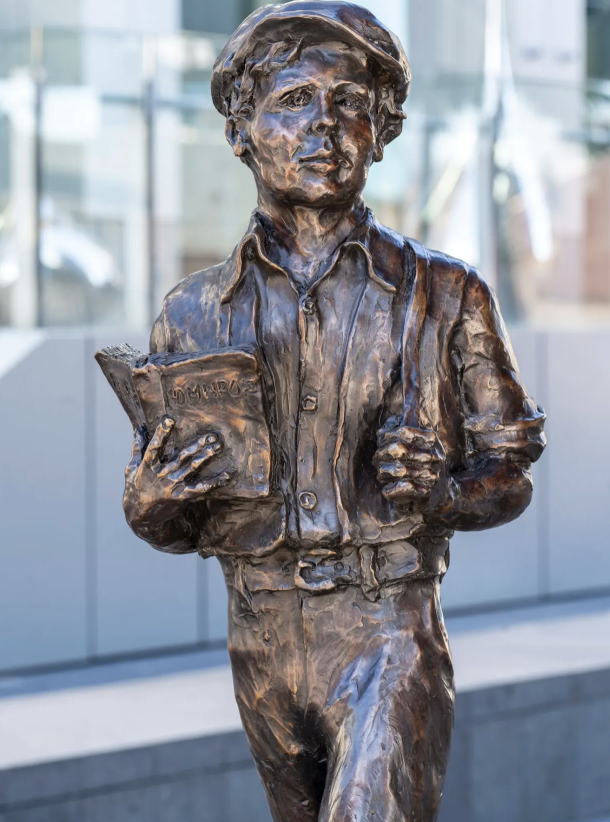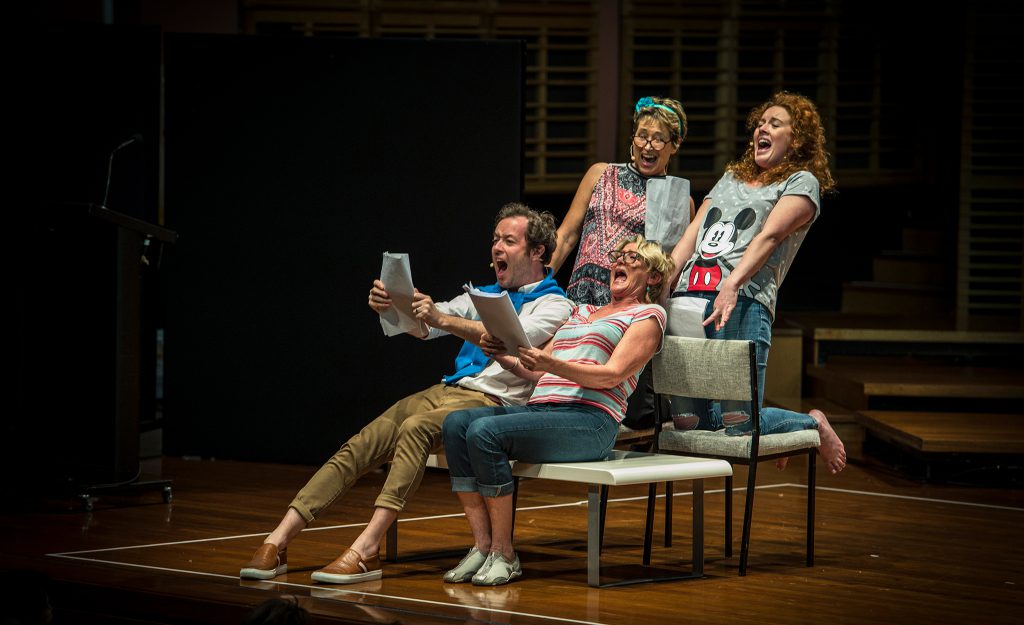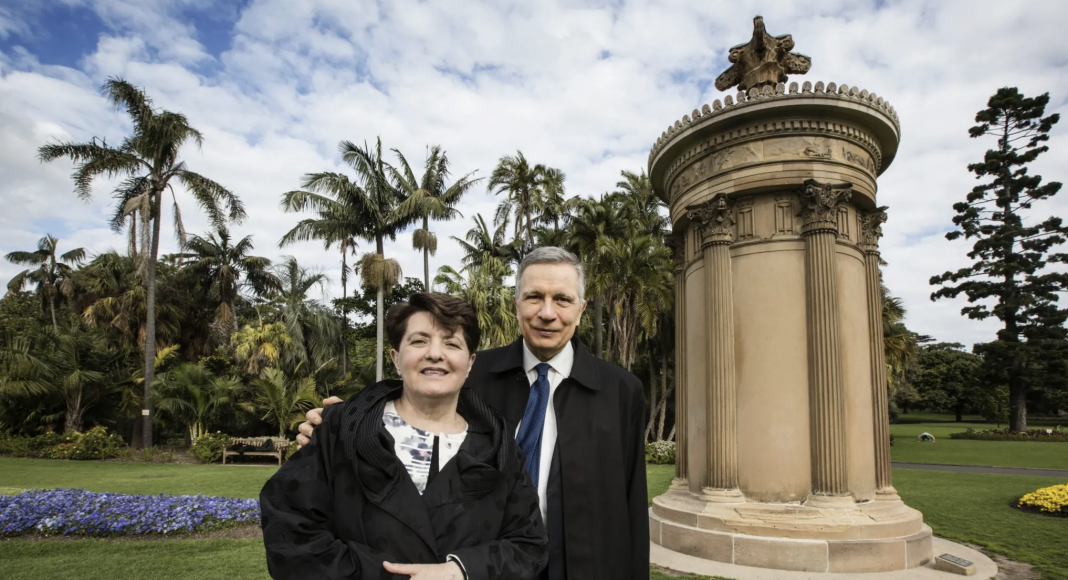The Lysicrates Foundation was established in 2014, by Sydney couple John and Patricia Azarias, in an effort to restore the Lysicrates Monument replica that currently sits in the Sydney Botanical gardens. The foundation has now grown into an organisation that is dedicated to upholding and expanding the dramatic arts in Australia through the ‘Lysicrates Prize’ competition.
Founder John Azarias spoke exclusively with the Greek Herald about origins of the foundation, maintaining the essence of Greek drama in the arts, and their hopes for national expansion of the Lysicrates Prize competition.
Establishing the foundation to preserve the Lysicrates Monument in Sydney’s Botanic Gardens, what inspired you to additionally use the foundation to promote the dramatic arts?
We knew that the marble original, commissioned by a Mr Lysicrates in 334 B.C. and still standing in Athens today, had been built to celebrate Lysicrates’ win in the Great Dionysia of that year. The Great Dionysia was the drama competition that stopped the city of Athens for a week every year and that was held in the huge Theatre of Dionysus just under the Acropolis. Lysicrates was a rich man, not a playwright. Those who actually won the competition were all the wealthy sponsors of the troupes of actors and choruses that performed plays written by authors. It was so prestigious to have won that those wealthy sponsors competed to see who could put up the most beautiful monument to his success. Except for the Lysicrates, all those monuments have vanished now, but what has remained are the flimsy, but infinitely longer-lasting, products of the writers’ brains – Oedipus Rex, Antigone, The Frogs, and the other real monuments to human creativity.
We firmly believed that the real treasures of any society are its creative spirits. We knew there was a massive pool of Australian talent, in playwriting, acting and directing. So since we had restored the monument, it was logical to restore the event that the monument celebrated – a drama competition where the best local playwrights would compete, in front of a very diverse audience, for a prize that was effectively awarded by the audience itself. And that is what we set the foundation up to do.
The Lysicrates Monument was successfully restored and unveiled in October 2016. What are your leading reasons for continuing the work of the foundation and holding the Lysicrates Prize event every year?
We have been tremendously heartened by the ever-increasing success of the competition. In the first year, we had 14 submitted plays; every year the number has risen, and this year there were 49 entrants. In our first five years, five plays have gone on to full commercial production, both in Sydney and in Melbourne. These are plays that would never have seen the light of day without the Lysicrates Competition, and that success rate is a record in the world of Australian theatre. We believe that one or two of them are actually real masterpieces. The feedback we have had from audiences and writers has been fantastic. We have learned that the democratic voting model we have taken from the ancient Greeks is just as popular today, in a country they never knew existed, as it was there, 2,500 years ago. We love the fact that we are acquainting Australians with the triumphs and practices of classical Greeks, and we never want to give up on that. Those are really our leading reasons.

The Lysicrates Prize event sees plays performed with a variety of genres and stories. Why do you think it is important to keep the competition open to all forms of plays with different stories?
For the first five years, we placed absolutely no restrictions on the writers. All we asked them to do was to submit the first act of a new play. The fifteen finalists took us at our word. There were farces, tragedies, family dramas, all kinds of submissions. We felt this was the only way for real Australian voices to express themselves freely.
Over the past five years, we made a couple of discoveries. First of all, audiences typically seemed to go for the most moving tragedies. But perhaps most important, we also found that a genuine Australian voice seemed to be emerging, which combined comedy and tragedy in sometimes very skilful ways – the tear in one eye, the laugh in the other. This year we asked writers to submit only comedies, but lo and behold, we got the same result – plays that combined the laugh with the sob or the sober reflection. We loved that. We want that to continue. It’s authentically and naturally Australian, and it seems to emerge whether the play is a tragedy or a comedy.
Why do you believe it is important to promote Lysicrates’ story?
The story of Lysicrates has many dimensions. It is about the artistic triumphs, in theatre and architecture, of the golden period of Athenian history. It is about the invention of democracy in the theatre. It is about enhancing the links between Greece and Australia. It is about bringing to the theatre people who have never set foot inside one, and introducing them to the magic of live drama. It is also about the extraordinary man who commissioned our sandstone copy of the monument, James Martin, a poor Irish immigrant boy who rose to become a wealthy barrister, three times Premier of NSW, Chief Justice and prominent Hellenophile. These are all reasons we believe it is important for the Lysicrates message should be made known to as many people as possible.
What would you say is your most proud achievement for the Lysicrates Foundation?
Hard to choose. Seeing the absorption of the kids’ faces as they watch a theatre performance, many for the first time, at the Martin-Lysicrates Competition, an offshoot we’ve created for plays written for kids years 7 and 8. Watching them exercise their democratic vote for the first time. Watching a full performance of one of our Lysicrates plays, reading the great reviews, and seeing the face of the playwright as the audience applauds. Knowing that because of the foundation, a play now exists that could easily become an Australian classic and would never have been written otherwise. Watching kids of every colour and background come up to the statue of James Martin, read his story, and walk away thoughtful, and hoping they’re thinking, well, he started with no advantages, and succeeded in this country, maybe I can too. Knowing that we have brought the glory of Greece to Australians young and old. All those things. And plenty of others!

How do you see The Lysicrates Foundation and the Lysicrates Prize event expanding and continuing for the future?
We have big dreams ourselves! There are Lysicrates plays we would like to take on tour in country NSW and other states of Australia; we would even like to take these unknown Australian voices to the great theatre centres of the world.
Starting the foundation with your wife Patricia, how has the foundation expanded both your views on the arts in Sydney?
We have realised how incredibly much is achieved in the arts in Australia by tiny, under-resourced groups. We have been amazed at the quality of our Australian actors. We have been charmed by that typical Australian ability to write with, as I said earlier, the tear in one eye and the laugh in the other. We began with great respect for Australian artistic ability, but even so, we have been astonished at how good our artists really are.
Being from the Greek community of Alexandria in Egypt, how important is it for you to continue expanding the knowledge of Greek history in Australia and in the Sydney Arts?
Incredibly important. I am pleased that the foundation was the catalyst for the creation of the first textbook made in Australia that teaches the Classical Greek language to kids from an Australian perspective. I am steeped in Greek culture myself, and one of the things I have tried to do, most notably in the beautiful books produced by the Lysicrates Foundation, is to commission and include illustrated articles on Greek themes, and write some of them myself.
How do you see the future of Greek culture in Australia and what do you think needs to happen to better preserve it?
There is a true renascence of the arts in Greece – an artistic and intellectual effervescence. Australians of Greek descent should become better acquainted with this world, and also try and act as a bridge between Australian and Greek creativity.
